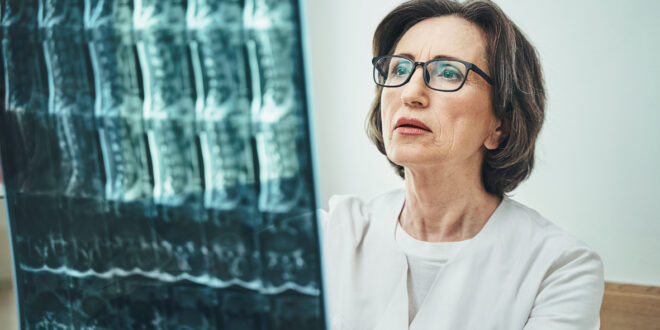Almost 40% of Kiwis now have medical insurance. Some of the best health insurance policies provide regular check-ups designed to pick up any issues at an early stage, which is good news, especially as we move into an older age bracket. For those who don’t have regular check-ups, however, a serious and often undiagnosed bone health issue may go unnoticed. We’re talking about osteoporosis, often referred to as a ‘silent disease’ because it isn’t picked up until a health crisis occurs. But here’s the thing: this bone condition affects a staggering one in five women, and one in 20 men, aged 50 and over.
Bones are living tissue
Our bones are made of living tissue, constantly being broken down and reabsorbed, but also built up. This finely tuned balance helps maintain bone density and strength. However, as we age, the balance tends to move more towards the reabsorption side of the equation. When the balancing act gets seriously out of kilter, conditions known as osteopenia and osteoporosis can develop. In both cases, protein and mineral bone content are reduced, with osteopenia being the earlier of the two stages, and a warning that osteoporosis could be on the horizon if medical intervention isn’t pursued.
Osteoporosis is a serious issue because it leads to a higher risk of fracture (bone-breakage), especially in the hip, wrist, and spine. In fact, if osteoporosis reaches a critical stage, even simple movements such as a cough, a bump, or rolling over in bed, can cause a fracture. For those with osteoporosis, fracture healing can take longer and result in increased pain. It can also mean, in cases of major bone breaks, mobility and independence can be lost.
If it all sounds frightening, the good news is, whether or not we have medical insurance, we can still be doing everything we can to have the state of our bone health checked out professionally. The state of our bone health is diagnosed using several different methods, including our GP looking at our various risk factors like our history of broken bones as we age, our family history of broken bones, our dietary habits, weight, exercise routines, long-term use of medication, and how our hormone levels over the years have been affected by various factors. Early menopause, thyroid conditions, and cancer-related treatments, such as chemotherapy, all have a part to play in the condition of our bones as we age. There’s another vital tool commonly used to screen for bone health, the DEXA scan.
DEXA scans use very small amounts of radiation to measure bone density deterioration. When given early enough, they help detect the very beginnings of osteoporosis, catching it in its early stages so treatment can be started sooner, rather than later. In this way, the risk of bone breakage is reduced as much as possible.
Sadly, although osteoporosis costs our taxpayer-funded public health system hundreds of thousands of dollars each year, and despite lobbying (for years) from professional bodies, DEXA screening is still not government funded (in the same way bowel and breast screening is funded). This inequitable situation doesn’t have to be the end of the story, because if in consultation with your GP, you decide you want a DEXA (but don’t meet the eligibility for a free scan), you can opt to pay for it yourself – and it may well be worthwhile.
Although DEXA scans generally cost in the region of $350, they can be sourced for much less (in some cases, close to $100) when you shop around. That’s why, even if you don’t have medical insurance covering such things, you shouldn’t be afraid to ask your GP if it’s advisable for you to have a DEXA, and if it is, to then phone around the various clinics providing DEXA’s to find the best price. You might even decide to ask your family for contributions towards a DEXA in lieu of birthday or Christmas presents, or to go without some non-essentials (such as magazine subscriptions or Lotto tickets) until you’ve saved up the cost of a DEXA. If you do discover treatment for osteopenia or osteoporosis is required, it can be government funded (depending on the treatment you opt for).
Check with your GP today, to see if they advise a DEXA scan for you. And in the meantime, check out Osteoporosis NZ for more information on your risk factors.









Join the Discussion
Type out your comment here:
You must be logged in to post a comment.